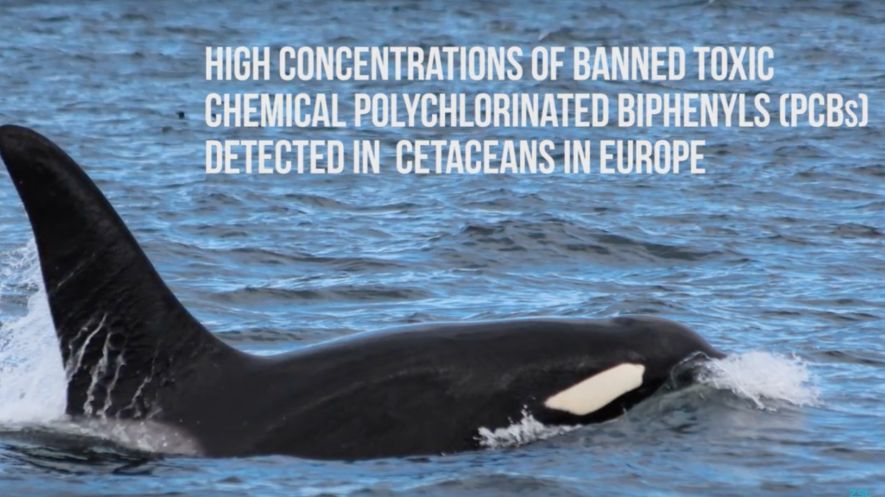Killer whales are facing the threat of extinction in European waters as a result of lingering toxic chemicals banned as far back as the 1980s, according to research led by international conservation charity the Zoological Society of London (ZSL) and published 14 January 2016 in the journal Scientific Reports.
The research, based on long-term studies of more than 1,000 stranded or biopsied whales, dolphins and porpoises – collectively known as cetaceans – found that the blubber of killer whales (Orcinus orca), bottlenose dolphins (Tursiops truncatus) and striped dolphins (Stenella coeruleoalba) in Europe contain among the highest concentrations of polychlorinated biphenyls (PCBs) on the planet.
PCBs are a group of man-made chemicals previously used in the manufacture of products including electrical equipment, flame retardants and paints. High exposure to PCBs is known to weaken cetacean immune systems and markedly reduce breeding success by causing abortions or high mortality in newborn calves. A video detailing the issue can be viewed here.
Dr Paul Jepson, lead author and specialist wildlife veterinarian at ZSL’s Institute of Zoology, said: “The long life expectancy and position as apex or top marine predators make species like killer whales and bottlenose dolphins particularly vulnerable to the accumulation of PCBs through marine food webs. Our findings show that, despite the ban and initial decline in environmental contamination, PCBs still persist at dangerously high levels in European cetaceans.
“Few coastal orca populations remain in western European waters. Those that do persist are very small and suffering low or zero rates of reproduction. The risk of extinction therefore appears high for these discrete and highly contaminated populations. Without further measures, these chemicals will continue to suppress populations of orcas and other dolphin species for many decades to come.”
The research also identifies locations around Europe as particular global PCB ‘hotspots’, including the western Mediterranean Sea and south-west Iberian Peninsula. Concentrations of these chemicals tend to remain higher near industrial areas and densely-populated urban centers, making European waters especially vulnerable.
Co-author Robin Law said: “Our research underlines the critical need for global policymakers to act quickly and decisively to tackle the lingering toxic legacy of PCBs, before it’s too late for some of our most iconic and important marine predators. We also need to better understand the various pathways through which these iconic species are able to accumulate such high PCB concentrations through their diets.”
As part of efforts to build understanding of the threats facing orcas in the wild, CSIP will host a scientific panel event – ‘What’s Killing the Killer Whales?’ – at ZSL London Zoo on the evening of Tuesday 9 February. Speakers will include Dr Paul Jepson, lead author of this report. For more information, please click here.
ZSL is a partner in the UK Cetacean Strandings Investigation Programme (CSIP), which was established in 1990 to coordinate the investigation of all whales, dolphins and porpoises that strand around the UK coastline, as well as any marine turtles and basking sharks. The Programme is funded by Defra and the Devolved Governments of Scotland and Wales. The Joint Nature Conservation Committee (JNCC) acts as contract manager on behalf of funders. For more information on CSIP, or to report a stranded cetacean, please click here.





